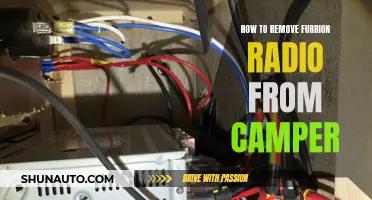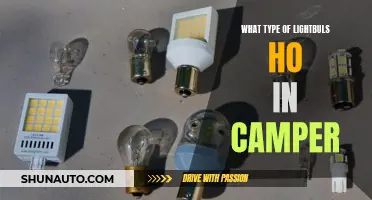
Flushing tampons down the toilet of an RV or camper is not recommended. While tampons are biodegradable in landfills, they are not processed by wastewater-treatment facilities and can clog pipes, damage septic systems, and cause blockages in the black water tank. This can lead to costly repairs and an unpleasant odour. It is best to dispose of tampons in a bin, wrapped in toilet paper or a feminine hygiene bag.
| Characteristics | Values |
|---|---|
| Should you put tampons in a camper toilet? | Technically, yes, but it is not recommended. |
| Why? | Tampons are designed to absorb liquid and expand, which can lead to blockages in the pipes and tanks. |
| What should you do with tampons instead? | Dispose of them in a bin/trash can, wrap them in toilet paper or use feminine hygiene bags. |
| What about biodegradable tampons? | Biodegradable tampons made from 100% cotton can be disposed of in septic tanks or chemical toilets. |
| What about flushing other items? | Only urine, faeces, water and RV-approved toilet paper should be flushed. |
What You'll Learn

Flushing tampons can cause blockages
Additionally, tampons are made of materials that do not break down easily, especially in water. The chemicals used in RV black water tanks are not strong enough to break down tampons, so they can get trapped in the tank and cause problems such as clogs and bad odors. The absorbent nature of tampons means they will trap a lot of liquid in the black water tank, leading to a fuller tank and a higher risk of blockages.
Flushing tampons can also cause sewage backflow, which occurs when the water pressure inside the pipes is not strong enough to push the tampon out, causing it to be pushed back into the toilet and potentially into the camper. This can lead to a messy and costly cleanup and pose serious health risks if there is exposure to human waste.
To avoid these issues, it is recommended to dispose of tampons in a bin specifically designed for feminine hygiene products or wrap them in toilet paper and throw them into a trash can. These bins can be emptied regularly, helping to keep the camper in good working order and avoiding costly repairs.
Ford Escape: Camper-Friendly or Not?
You may want to see also

Tampons don't break down easily
Tampons are designed to absorb liquid and expand, which is why they are so effective at managing menstrual flow. However, this very feature that makes tampons useful can also cause problems if flushed down a toilet, especially in an RV or camper.
RV and camper toilets are designed to be lightweight and easy to use, but this means they have smaller tanks and simpler systems than regular toilets. These tanks are sensitive and can be easily clogged by items that do not break down quickly. Flushing tampons can lead to blockages and unpleasant odours.
Tampons are not easily processed by wastewater treatment facilities and can cause damage to septic systems. This is why it is generally recommended that only pee, poop, and toilet paper be flushed down an RV or camper toilet.
So, what should you do with used tampons in an RV or camper? It is recommended to wrap them in toilet paper or a disposable bag and throw them in the trash. This simple practice will help prevent any potential problems caused by flushing tampons.
While it may be tempting to flush tampons for convenience, it is important to remember that doing so can lead to clogged tanks and plumbing issues. By properly disposing of tampons in the trash, you can avoid these problems and ensure a smoother experience during your travels.
Finding Your Perfect Small Camper Rental
You may want to see also

Only flush human waste, urine, water and approved toilet paper
Flushing tampons down a camper toilet is not recommended. Camper toilets are designed to receive only human waste, urine, water, and approved toilet paper.
Camper toilets are different from household toilets. They use a simpler system to be lightweight and easy to use. Camper toilets collect waste in a tank, which is then broken down and emptied at an RV waste dump. The tanks are not very large, so what you flush matters. Flushing items that do not break down easily can cause blockages and contribute to unpleasant odours.
Tampons are designed to absorb liquid and hold it without breaking down. This is the opposite of what you want items to do in a camper septic tank. Flushing tampons can cause blockages in the tank or pipes, which can be frustrating, time-consuming, and expensive to fix.
To avoid these issues, it is recommended to dispose of tampons in a bin or trash can. You can wrap the tampon in toilet paper or a disposable bag and throw it away. Some campgrounds may also have bins specifically designed for sanitary products, which can be emptied when full.
In summary, to maintain the proper functioning of your camper toilet and septic system, only flush human waste, urine, water, and approved toilet paper.
Nissan Frontier's Camper Towing Capacity: How Big?
You may want to see also

Flushing tampons can cause bad odours
Flushing tampons down the toilet can cause blockages in the pipes. This is because tampons are designed to absorb liquid and expand, rather than break down like toilet paper. As a result, they can get tangled in plumbing pipes, or become saturated with liquid, swollen, and lodged in your plumbing. This can cause blockages that prevent the normal flow of waste through your pipes.
If you are using an RV or camper toilet, flushing tampons can block up your black water tanks. These tanks are not very large and are designed to be simple and lightweight. Flushing tampons down the toilet can cause blockages and prevent the tanks from breaking down waste properly. This can lead to unpleasant odours in the coach area of your RV or camper.
Flushing tampons can also cause plumbing issues in your home. Blockages in your home plumbing can cause sewage to back up and flow into your home, creating a serious health hazard. Repairs to fix this kind of damage can be very costly.
Flushing tampons can also cause issues in your hometown's sewer system. Blockages in these pipes can cause sewage to spill into streets, basements, and local waterways. This can create an unsanitary environment and contaminate water sources.
To avoid these issues, it is recommended to dispose of tampons by wrapping them in toilet paper or facial tissue and throwing them into the garbage. Small bags are also available for wrapping used tampons before disposal. In the workplace, the Occupational Safety and Health Administration (OSHA) recommends that tampons be discarded into lined waste containers.
Camper-Pulling Power: Toyota Tundra's Towing Capacity Limits
You may want to see also

Use a bin for tampons and other sanitary products
It is highly recommended that you use a bin for tampons and other sanitary products when using an RV or camper toilet. This is because tampons are designed to absorb liquid and expand, which can lead to blockages in the pipes and septic tank. The last thing you want is a clogged toilet while camping!
RV and camper toilets are designed for human waste and toilet paper. The septic tanks are smaller and use simpler systems to be lightweight and easy to use, so it's important to be mindful of what you flush. Only waste and RV-approved toilet paper should be flushed to prevent blockages and premature fill-ups, which can be frustrating, time-consuming, and expensive to fix.
So, what should you do with your used tampons and other sanitary products? The best option is to wrap them in toilet paper or disposable bags and dispose of them in a bin. You can then empty the bin at stops or campsites. Some campgrounds also provide feminine hygiene bags designed for this purpose, which are usually solid in colour to disguise the contents and lock in odours. If you don't have access to a bin, make sure to carry your wrapped tampons in a baggie to dispose of in a trash can.
If you're looking for an environmentally friendly alternative, consider using menstrual cups. This option requires no disposal as you simply empty and rinse the cup. Cloth pads or underwear with great absorption can also be used, especially on light flow days.
Remember, it's important to dispose of tampons and other sanitary products properly to avoid damaging your RV or camper's plumbing system and to keep your living space odour-free!
Drywall Mud in a Camper: Is It Possible?
You may want to see also







